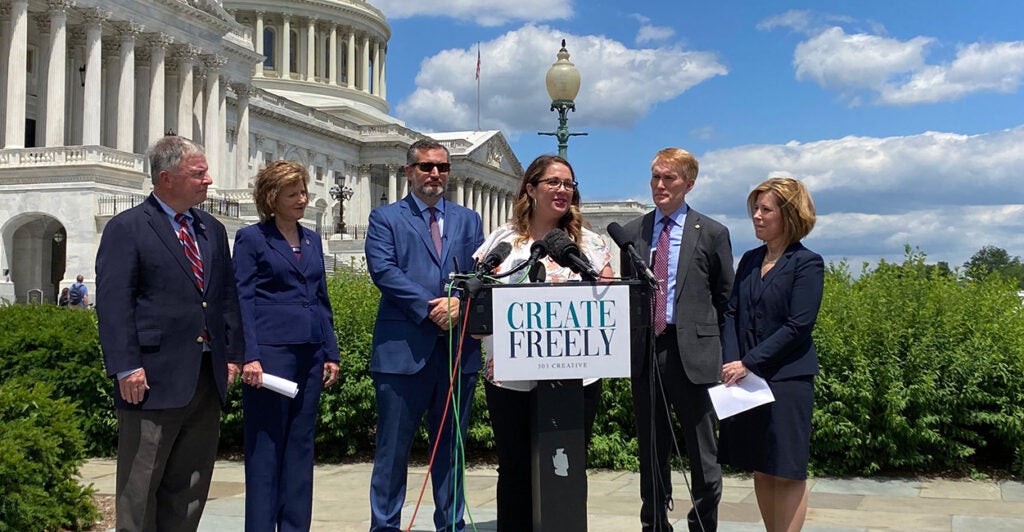The Supreme Court next fall will hear arguments in the case of a Colorado graphic designer who says a state law forces her to supply services for same-sex weddings, a violation of her religious beliefs and right to free speech.
Alliance Defending Freedom, a nonprofit legal organization focused on protecting religious freedom and free speech, held a press conference Wednesday outside the U.S. Capitol to highlight Lorie Smith’s lawsuit against the Colorado Civil Rights Commission.
“All of us should be free to say what we believe, even if the government disagrees with those beliefs,” Smith said at the event.
Lawmakers in attendance included Sens. Ted Cruz, R-Texas; James Lankford, R-Okla.; and Marsha Blackburn, R-Tenn.; as well as Reps. Doug Lamborn, R-Colo.; Debbie Lesko, R-Ariz.; and Vicky Hartzler, R-Mo.
A total of 18 senators and 38 House Republicans filed an amicus brief June 2 in support of Smith.
“Free speech is an inalienable human right, and it is the foundation for self-government,” Kristen Waggoner, ADF general counsel, said at the press conference. “The government doesn’t grant us this right, but fortunately, our Constitution protects it and we are stewards of that freedom.”
Smith went to court in 2020 over the Colorado Anti-Discrimination Act, which the graphic designer argues would force her and her company, 303 Creative, to create projects that violate her personal religious beliefs about marriage.
Smith refuses to create custom wedding websites for same-sex couples, saying the creation of such work would require her to condone the content. “Lorie enjoys working with people from all walks of life, but, like most artists, can’t promote every message,” an ADF press release says.
Smith’s case is similar to the long-running legal fight of Colorado baker Jack Phillips, a Christian who the Human Rights Commission determined had discriminated against homosexuals because he declined to create a custom cake to celebrate the wedding of two men.
ADF argues that like Phillips, also its client; Smith; and others should be allowed to “create freely.”
The graphic designer is appealing a July 2021 decision by the 10th U.S. Circuit Court of Appeals that Colorado could force Smith to design projects that blatantly violate her beliefs, because of the state’s so-called duty to ensure equal access to her “custom expression.”
The 10th Circuit ruled against Smith while acknowledging that her refusal to create projects for same-sex couples was based solely on her objection to the content, not the customers, and affirming that creating a website is a form of speech protected under the First Amendment.
At the press conference, Cruz said Smith’s Supreme Court case has universal importance and would set an important precedent for free speech:
Colorado wants to compel the speech of Christian artists and business owners who decline to use their God-given talents to celebrate events that run contrary to what their faith teaches. Colorado law restricts the fundamental First Amendment rights of Lorie and other business owners like her. And it doesn’t just target Christians only.
Consider it this way: Should a Muslim artist be compelled by the government to draw the image of Muhammad? Should Jewish artists be forced to create art that they consider to be antisemitic? Should a Democrat political firm be forced to take on Republican clients?
Smith appealed to the Supreme Court last September and the high court accepted her case in February. The high court will hear oral arguments in 303 Creative v. Elenis in the fall.
According to a court brief, Smith seeks permission to “design wedding websites promoting her understanding of marriage” and to “post a statement explaining that she can only speak messages consistent with her faith.”
In effect, she seeks the high court’s protection from the Colorado Anti-Discrimination Act, which “requires her to create custom websites celebrating same-sex marriage and prohibits her statement—even though Colorado stipulates that she ‘work[s] with all people regardless of … sexual orientation.’”
Have an opinion about this article? To sound off, please email letters@DailySignal.com and we’ll consider publishing your edited remarks in our regular “We Hear You” feature. Remember to include the URL or headline of the article plus your name and town and/or state.
